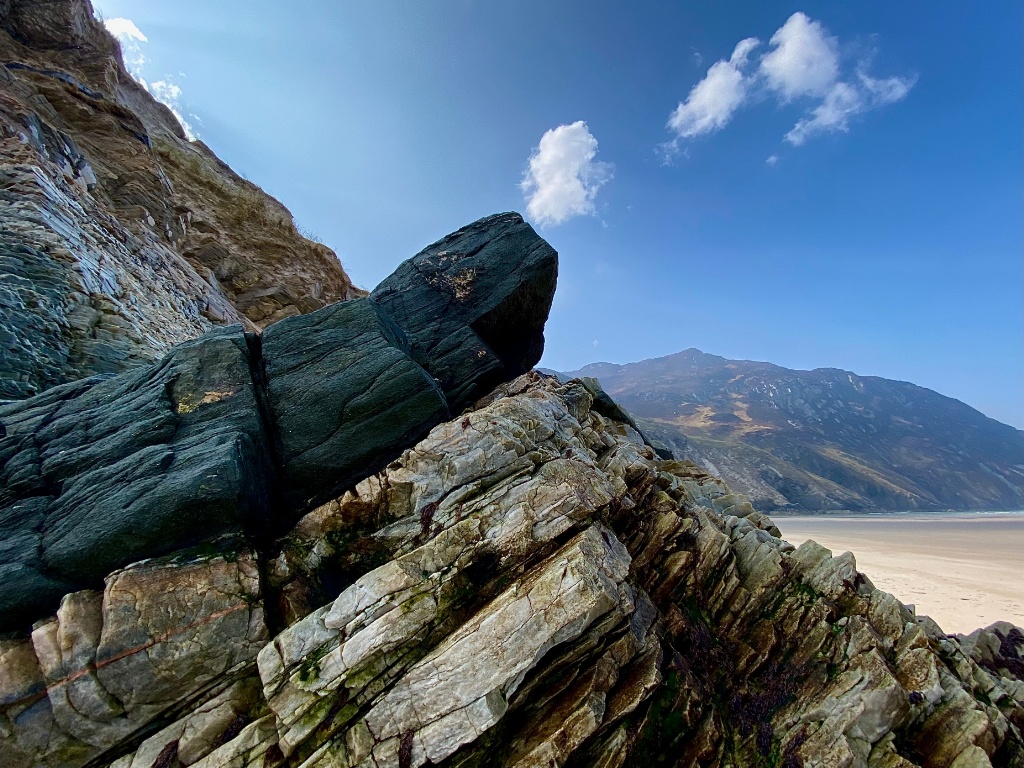Holy Smoke!

The geology of Donegal in North-West Ireland is extraordinary, but its contemporary rocks have given up smoking, despite this pic!
Quote of the Day
Could it really be only a year and a half ago that the British government was declaring, shamelessly, its intention to break international law? And adding that this was ok because, In the words of the Northern Ireland Secretary, Brandon Lewis, it would do so only in a “limited and specific” way?…And now Boris Johnson is preaching to the world “It is no longer enough to express warm platitudes about the rules-based international order. We are going to have to actively defend it against a sustained attempt to rewrite the rules.”
- Fintan O’Toole in the Irish Times, 29.03.2922
Musical alternative to the morning’s radio news
Mark Knopfler | The Long Road
Long Read of the Day
The First Authoritarian: Popper’s Plato
Interesting essay by Tae-Yeoun Keum on the interpretation of Plato and his ‘Republic’ in Karl Popper’s The Open Society and its Enemies.
Today, The Open Society and Its Enemies is perhaps best remembered for two things: Karl Popper’s coinage of the terms “open society” and “closed society,” and his scorched-earth attack on Plato as the original architect of the latter. For Popper, Plato was the first and the most influential authoritarian thinker.
The assault on Plato took up the first of the book’s two volumes.
Focusing on Plato’s Republic and its blueprint of a city ruled by a handful of elite philosophers, Popper argued that Plato had produced a vision of one such closed society. He pointed to the stratification of the social order in Plato’s ideal city, the strict division of labor between the intellectual and productive classes, the absence of social mobility, state censorship of most culture, and, above all, the promulgation of an openly fraudulent myth, the so-called Noble Lie, to legitimize the status quo. All of this, Popper observed, amounted to nothing less than a dictatorship of philosopher-kings who peddled myths to their subjects in order to suppress free thinking and to lock them into a rigid caste system. The whole business of Plato’s politics boiled down to maintaining this scheme: an effort to “arrest all change.”
The implication was that Plato’s ideas had found their incarnation in fascism. Popper wrote that the Noble Lie, the foundation myth of Plato’s Republic, was “an exact counterpart” to the Nazi’s “modern myth of Blood and Soil.”
When I first read The Open Society… as a student, I rather ignored the attack on Plato and was much more interested in Popper’s critique of Marx, so it was interesting to come on an essay that explains the renewed interest in Plato that followed the election of Trump and the view that some kind of “epistemic democracy” was needed if society were to avoid that kind of degeneration.
Which explains why I enjoyed the piece and thought that you might too.
Applebaum on ‘Putinism’
Transcript of an interesting conversation between Yascha Mounk and Anne Applebaum.
I found this exchange particularly interesting…
Mounk:There was a very clear and specific goal in the actions of the Soviet Union in the post-World War II period: they wanted to erect a communist regime. Part of the point was that it would be subservient to the will of Moscow or the Kremlin, but another part of the point was a set of ideological goals for what those societies would look like internally.
What is the nature of the Putin regime today? It started off as just a kind of kleptocratic dictatorship. There’s an argument being made that Russia is quickly turning into a kind of totalitarian society, but one without a very strong ideology. It does not have the strength of ideology that the Third Reich or the Soviet Union had. What do you think Russian society is going to be like after the war if Putin stays in power? What would following the same Soviet playbook without its ideological foundation look like?
Applebaum: I have actually been arguing for about 15 years that there is a kind of ideology of Putinism: there is a theory of history, an economic theory, and a kind of politics. The theory of history is that Russia was robbed at the end of the Soviet Union when it broke up, the 1990s were a disaster (when the West sought to destroy Russia), and then Putin began to rebuild Russia. There’s a kind of resentment and nostalgia that work together. To explain everything that’s happened in the last 30 years, there’s a kind of fake democracy and fake capitalism. There are some of the forms of capitalism, but in fact, the economy is controlled from above by a group of oligarchs. There appear to be democratic elections, but in fact, the outcomes are predetermined. You have a managed economy and a managed democracy. And there is an elite behind it who controls things, like puppet masters.
Worth a read.
My commonplace booklet

The Leica 0-Series No.105 was also one of the personal cameras of Oskar Barnack – the inventor of 35mm photography. Barnack used the 105 to capture motifs from his family life, gaining technical insights that he then applied to the further development of the camera and its succeeding models.
Up for auction its estimated price of €2-3 million (roughly $3.3 million / £2.5 million), with the starting bid standing at $1.1 million.
(And I won’t blame you if you file this under ‘camera porn’. For that is what it is.)
This Blog is also available as a daily email. If you think that might suit you better, why not subscribe? One email a day, Monday through Friday, delivered to your inbox. It’s free, and you can always unsubscribe if you conclude your inbox is full enough already!
